Text
Deadwood The Movie Review
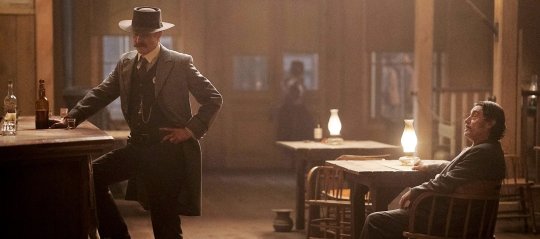
“Our Father which art in Heaven..” “Let him fucking stay there”
12 years. That is the length of time between the initial commissioning of a Deadwood film and it actually airing. In that time its cast went on to populate just about every great TV show of the last ten years, its creator David Milch has had various projects fail for reasons as varied as low ratings to equine welfare, only to then be diagnosed with Alzheimer’s. So often in pop culture these long, attritional tales of production end in disappointment. Whether its Axl Rose and Chinese Democracy or Terry Gilliam and The Man Who Killed Don Quixote, these mythical projects can’t help but underwhelm and are sometimes better left mythical.
Not fucking Deadwood.
While flawed, Deadwood: The Movie never disappoints and immediately feels necessary in a way that these kinds of continuations/revivals so rarely do. It is interesting to me that Deadwood the Movie came out the same year as El Camino: A Breaking Bad Movie. Unquestionably two of the greatest dramas ever aired Breaking Bad and Deadwood; I think fundamentally only one of these films works.
I’ve already written a review of El Camino which you can read so I won’t rehash my thoughts on that too much but suffice to say while I mostly found it harmless it never for me justified its existence. Breaking Bad had ended conclusively on its own terms, in a very satisfying way. Deadwood on the other hand ended in very different circumstances, with a cancellation that neither side wanted, but as a result of some confusion happened anyway.
This is not to say I didn’t have some reservations about Deadwood coming back though. While the final episode of its original run was clearly never designed to be a final episode and therefore is quite unsatisfying in many ways, one truth of filmmaking and certainly television is the most important shot is the last one. Series finales are almost all defined by their closing moments and final image and Deadwood’s is an all-timer. Al scrubbing the blood left by murdering the prostitute made to look like Trixie says everything Deadwood ever had to say. History is the agreed upon lie. And there are bloody and tragic consequences to maintaining that lie that men like Al are left to clean up.
Milch would struggle to come up with a moment that encapsulates the rich themes of his masterpiece as well as that one to close this film on, but he comes mighty close with those final lines of dialogue quoted above.
One of the other key differences between El Camino and this is the ways in which this film does acknowledge the passage of time. While the former starts immediately after the final moments of Breaking Bad, Deadwood: The Movie takes places almost in real time, 10 years after the finale. In its tone and dialogue it acknowledges this passage of time throughout.
Yet in another way it feels very much like a condensed version of what season 4 of Deadwood would have been, had that cancellation never happened. The conflict with Hearst continues to drive proceedings as it was always planned to do. Of course certain problems come with this condensed nature. Certain plotlines, like Harry joining Hearst’s side, or the arrival of the new prostitute working at the saloon don’t feel truly explored and certain characters don’t maybe get the screen-time we would have hoped for, but that’s to be expected.
Even with this passage of time, it feels like Deadwood. Having said this I would say that there is a subtle difference of emphasis from Al to Seth. While Olyphant was always the first credited in the show’s title sequence it always felt like Al was the true protagonist of Deadwood’s original run. It’s part of the reason, despite Deadwood being his best show; I’ll always see Olyphant as Justified’s Raylan Givens before I see him as Seth Bullock. Al was always the breakout character and face of the show but this film is really more about Bullock and that’s not a bad thing.
Olyphant, a bit like contemporary prestige TV hunk Jon Hamm, has carved out a bit of niche playing douche-y versions of himself in sitcoms (mostly in cameo appearances) since the conclusion of Justified. So watching this film was a nice reminder of what a fantastic dramatic actor Olyphant is and has been for many years.
His screen-time with Ian McShane remains totally electric and a highlight of the film but I think just as much as the film is about Al’s deterioration it’s about Seth’s journey too. Bullock arrived into Deadwood to establish some law in this most lawless of places. This film is about him trying to maintain those values in the face of Hearst. In the film’s climatic moments when Seth is dragging Hearst handcuffed to the station Deadwood civilians grab a hold of Hearst and begin beating him to death. For a moment Bullock stops and almost allows the thing he has fought against for so long to happen, because he like most of Deadwood would probably like to see Hearst dead, but when he sees his wife Martha run away, he stops it.
The scene between him and Sam, singing together as the latter is in bed recovering subtly evokes the death of Bullock’s son in season two of the show and is an incredibly powerful moment and a rare one where we see him breakdown. In his final moments he returns to his wife and announces “I’m home.” As he kisses her it feels a triumphant moment but is it just another agreed upon lie? While the film isn’t able to explore it to the level it would maybe have liked to, the connection between Bullock and Alma is there for all to see, including Martha. Bullock has no real choice though but to live with the decision he made years ago to be with Martha, particularly now that they have a family again.
Fittingly we end with Al and those defiant final words. And it’s that writing by Milch that has always really elevated this show above so much else. With or without Alzheimer’s, writers much better than myself could spend millions of hours in front of keyboard typing before they got close to writing a line with lyricism, meaning and poetic profanity Milch laces every piece of dialogue with.
There are some fairly obvious holes to be picked here. Much as it feels a bit like what season 4 of Deadwood would have been, you could also argue it feels slightly like a rehash of the final few episodes, with one of Deadwood’s more likable inhabitants being murdered by Hearst and with Al and Bullock trying to deal with Hearst’s wanting Trixie dead. Having Trixie reveal herself to still be alive to Hearst also feels a bit cheap and more generally you could argue that this film does not do a whole lot to actually resolve a lot of the loose threads left by the series finale. But honestly I don’t really care. Having those characters, those performances by McShane, Weigert and Olyphant and those words of Milch on our screens again is more than enough for me.
A-
17 notes
·
View notes
Text
Normal People Review

One of the big hits of lockdown, Normal People is a really touching portrait of first love with a couple of star-making performances. Initially I wondered if the show would have been better suited to being a film but at 12 episodes long it really examines the relationship of Marianne and Connell to a level of detail that something 2 hours long couldn’t. I think at times, maybe in its third-quarter it takes a couple of slightly unnecessary detours but ultimately despite its quite simple story it justifies its length.
Each small moment of connection and rejection between the two leads feels significant and most importantly feels real. Despite Marianne being a pretty, no nonsense, genius, outsider and Connell being a hunky. sensitive poet, neither character feels like a YA cliche.
(Light spoiler) while some people have taken issue with the early season plot about Connell being embarrassed to be with Marianne and while I too am really sick of film/TV giving an objectively attractive woman a bun and glasses and then pretending they’re hideous, I don’t think that’s exactly what Normal People is doing. Instead I think the show captures the stupidity of even smart teens/young adults. How we were all insecure about silly things and desperate to impress people we didn’t even really like.
While Mescal and Edgar-Jones have all the makings of future household names, equally the star of the show is Abrahamson. The series is shot in a way that is consistently beautiful and ethereal. At times Sligo looks every bit as stunning as Italy but at other times he really brings out a coldness.
Having said all this, at times I did struggle a bit with the show. I think Normal People has to be one of the most humorless shows I’ve seen in a while. In its defense Normal People is often dealing with subjects a lot more serious than teenage love but at the same time I found parts of the show almost unremittingly depressing.
Oh yeah also every other episode there is an eight minute long sex scene. Thought it worth mentioning.
B+
4 notes
·
View notes
Text
Better Call Saul Season 5 Review
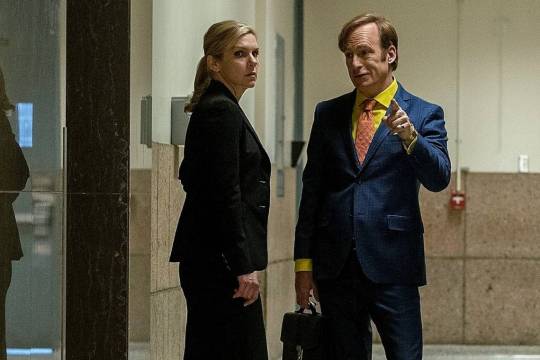
The difficult penultimate season. It is a somewhat under-discussed but common occurrence in TV drama. FX greats: Justified, The Americans and The Shield all had near faultless runs, but in their second to last seasons stumbled to different degrees. Depending on how you break it up The Sopranos experienced its weakest run of episodes in 6A before hitting its classic final stretch. Add to the list Six Feet Under and probably quite a few others and you can see that it resembles something of an obstacle for long-form TV drama. Why is this? In the aforementioned show they spend much of their penultimate season table-setting for their final run of episodes. It can sometimes be forgotten about because all of these shows stuck the landing (similarly Game of Thrones’ weak first half of its last season is largely forgotten about because the last 7 episodes are even worse) but nevertheless there can be a difficult balancing act between setting-up the all-important final season and delivering hours of TV that are satisfying in and of themselves. Thankfully it is a balance Better Call Saul strikes, not only managing to not falter but in fact exceeding with its strongest season yet.
So how does Better Call Saul succeed where others struggled? I think the answer is indicative of very nature of the show. Where the shows mentioned above spent 10 or so episodes, making sure all the dominos were set-up before they were to come crashing down, for BCS the end has always been in place. While Breaking Bad was a propulsive ride full of events; BCS has always been less concerned with getting to the next big moment, instead favouring the times in between. As a prequel we have always know the destination of this journey, admittedly with a couple of significant caveats.
The most significant of which being Kim Wexler. More than just the MVP of BCS, Kim is one of the most compelling characters on any TV series at the moment. Of course her story has the biggest question mark over it because she is the most major character in BCS not to appear in Breaking Bad, but through this season and in particular in the finale a whole new ambiguity comes over her arc.
Mimicking the finger guns gesture Jimmy made toward her at the end of the last season, which had signified his identity shift to Saul Goodman (as he made it official with a name change) Kim truly turns the tables here. After a night of appearing to be jokingly discussing the ways in which they may sabotage Howard’s career, it turns out Kim may not have really been joking. Despite everything Jimmy has done to Howard this season he is taken aback by the notion Kim would actually consider ruining a man’s career and life. Where we had always thought that this was the story of all the things that break Jimmy down into becoming Saul, the question now becomes whether this is in fact the story of Kim’s transformation?
The other key strength of Season Five was the way in which the show was finally able to intertwine its two halves. My biggest criticism of BCS in the past has always been that it felt like two separate shows edited together. On the one hand you have the Jimmy and Kim show and on the other you have the Mike show. The Mike show has always felt like more of a direct prequel to Breaking Bad, sometimes to its detriment. It is not to say it hasn’t been responsible for some great scenes or whole episodes in the case of season one’s Five-0 but at its worst it can sometimes feel like it is just filling in gaps in the Breaking Bad mythology (e.g. how did Hector lose the use of his legs). In the second half of this season though there’s none of that fragmentation. By finally having the two often separate strands linked the Mike show feels more vital than ever and we get the best run of BCS episodes yet (from about 5-9 I would say).
A large part of that is certainly down to Lalo Salamanca. Breaking Bad loved a big bad, whether it was Tuco, the cousins or a certain Gus Fring, the show was populated by some of the greatest villains in TV history. BCS in its earlier seasons had a fantastic villain but of a very different variety in the form of Chuck but with Tony Dalton’s scene-stealing turn as Lalo they have a truly great out and out antagonist.
The fact he is not in Breaking Bad would seem to point to only one conclusion when it comes to what exactly his fate will be, but the question remains just exactly what havoc he will wreak on his way there. Many expected this season to end with the death of Nacho, but while Gilligan and Gould spared him for now only time will tell. The finale itself actually felt a tad underwhelming on first viewing after the above mentioned run of classic episodes. In some ways it was frustrating but in a way that is typical of BCS.
Having said that, this season BCS was more willing than ever to embrace aspects of its predecessor. This season’s outstanding eighth episode (directed by Gilligan) largely set in the desert evokes some of Breaking Bad’s best hours. At the same time though BCS always feels distinct in various ways. In the penultimate episode Kim and Jimmy are backed into a corner when Lalo arrives and are forced to work some way out of it, much in the way Jesse and Walt so often were, but unlike Breaking Bad BCS revels in the anti-climax. No blood is shed in that scene. The finale is similar in this sense, while Lalo does admittedly massacre a small army of guys, the tragedy of this story lies beneath the surface. After their big confrontation with Lalo, Jimmy and Kim spend most of the finale in a hotel room not even discussing what had happened. Yet the show still mines a great power out of the smallest of gestures. No planes come down, no hospital rooms explode but this show never lacks in emotional depth.
While I recently re-watched Breaking Bad in its entirety, reminding myself what a clinically perfect piece of storytelling and film-making that show still is, season 5 goes some way to legitimizing the BCS vs Breaking Bad conversation. While I personally can never see myself subscribing to the view that BCS is a better show than Breaking Bad, the quality of this season on top of the already excellent previous four seasons, makes it seems a somewhat less outlandish claim, which I don’t believe could ever have been anticipated five years ago when this started.
Grade A
31 notes
·
View notes
Text
Some Thoughts on The Americans Finale:

Over the last few years I’ve watched a lot of finales to great shows (last year alone we had the ends of Halt and Catch Fire and The Leftovers) and when watching these episodes I’m often too anxious to really enjoy them-or if not enjoy properly experience them. When Mad Men ended I had spent so long considering how it would end that I struggled to have a clear and understandable emotional reaction to it, it took me weeks to really grasp whether I did or didn’t like it. This wasn’t the case when it came to The Americans.
Don’t get me wrong I felt crazy levels of dread, few shows ever inspired a constant sense of dread like The Americans, but it was really only in those last few moments I felt anxious about how it would end and if the end would be satisfying. That final car journey went on just long enough for me to consider the possibility that they would be swapped for Oleg or some other kind of fate would befall them that would feel convoluted and would have ruined the fantastic hour that had preceded it.
Instead the final scene perfectly clarifies what the show was. The Americans was always a family drama and more specifically a drama about a marriage. The details and nuances that elevate the show into the TV drama pantheon all come from the Jennings’ complicated but ultimately loving marriage. By his own admission Philip Jennings has had a shit life but if anything made both of their lives bearable its that, as Elizabeth says, they met each other.
That final scene is really the only respite though in a finale that is relentless. In some ways the true climax of the finale is the scene between Stan, Philip, Elizabeth and Paige. Keri Russell’s reactions in this scene are fantastic but really the scene is all about Philip and Stan. Their relationship has been a massive part of the show and its dramatic and fitting final confrontation.
Even with all cards on the table there is still an element of Philip playing Stan here. Philip still won’t admit to the all the murders that have been at the hands of him and Elizabeth, because he knows that would truly compromise their chances of getting out. Yet he also decides to be honest when Elizabeth is still trying to keep up the charade. “It was a job.” Philip cares enough about Stan to tell him in that moment. The balance and dynamic of their relationship remains as complicated as ever.
The final insult comes as Philip tells Stan that his wife may be a Russian. This is a great moment and a great way to end what is nonetheless one of the show’s weakest plots. They introduced her too late to really make the reveal of her as a Russian feel earned but then on the flip side if Renee was conclusively shown to not be Russian that would make the time spent with her feel equally redundant. In the end the best option is the one they take, to leave her a Schrodinger’s spy, but Fields and Weisberg did write themselves into a corner with her.
Stan’s end is about as tragic as you would expect. He lost his best friend, can never again trust his wife and must lie to his colleagues. The one thing he has left is his surrogate son and Henry will need him more than ever. Henry’s final conversation with his parents is possible the series most tear-jerking moment. He never had a huge role in the show but his role in the finale was heartbreaking.
Along with Stan Henry will also have his sister in his life still. The moment she got off the train is perfectly played. You are so tense when the cops are looking at Philip and Elizabeth’s ID, that once they’ve got past that hurdle your guard is left down just long enough for you to not see that coming. Soundtracked to With or Without You Fields and Weisberg weren’t leaving much room for subtly but as its the finale I’ll forgive them for their uncharacteristically obvious choices of soundtrack (Brothers in Arms also fits this category) .As an end for Paige though it makes so much sense. She can continue to live in America, only Stan knows of her involvement but he can never tell anyone about it. She can support her brother through this incredibly difficult period of his life. The final image of her sitting in Claudia’s home with a bottle of vodka, is again fitting and almost darkly comic.
So we end with just Philip and Elizabeth in Russia with only each other left. If any aspect of the finale divides opinion it might be the extent to which they got their comeuppance-or rather didn’t. In the end they lost contact with their children forever, were forced to return to a country that they once called home but that is now alien to them. They didn’t die nor did they go prison. It would be wrong to say the punishment they got was worse than that but in some ways Philip and Elizabeth had prepared themselves for prison and death all their lives, neither likely scared them, what they got in the end was more unexpected.
Elizabeth rationales with Philip that they brought Paige and Henry up right and that both are now adults who will get past all of this. In that moment that is enough for the Jennings, whether we believe Paige and Henry can ever truly heal the scars left by their parents.
And again in those final moments the dichotomy of Philip and Elizabeth comes through, he can’t bring himself to speak Russian, while Elizabeth always the more patriotic of the two signs off the show with a sentence in their native tongue. But just as their differences come through so does their love of one another and just the slightest glimmer of hope for both of them.
Because we’ve all been burnt by bad finales (Dexter, How I Met Your Mother) that damage the legacies of good/great shows, I think there is a tendency to over-hype any finale that isn’t terrible. Good final hours like for example Breaking Bad’s or Parks and Rec can be mistaken for great ones, purely out of a sense of relief. The Americans final episode though is without doubt a great one. Its a fitting end to a drama that has come as close as any to replacing the voids left by the ends of Breaking Bad and Mad Men, early on in The Americans run. This final hour like the whole series will go down as an all time great.
#The Americans#the americans finale#start#philip jennings#elizabeth jennings#keri russell#Matthew Rhys#stan beeman
13 notes
·
View notes
Text
Student Comedy Awards
Hey here is me performing at the London heat for the student comic of the year award-watch the vid and if u enjoy it please VOTE for me-the page were you can vote is the 2nd link may have to scroll down a bit but voting only takes a few seconds. Would be so appreciated.
https://www.youtube.com/watch?v=Yjq_DqmRCaY
http://www.chortle.co.uk/features/2018/02/26/39239/student_comedy_award%3A_more_videos_are_up
0 notes
Text
Mindhunter Review:

As is so often the way with me these days I’m about 2/3 months late to every major TV show, but now finally having finished Mindhunter I feel it is a show that warrants some closer attention. The Netflix model is one based all around probability, bring out enough shows and some will be successes and Mindhunter was certainly one of the good ones. With it’s fantastic cinematography and memorable performances it is undoubtedly one of the most watchable dramas Netflix has ever made-but like a lot of Netflix shows it was still something of a mixed bag.
Cutting to the point, from fairly early on Mindhunter struck me as having something of an identity crisis. It embraced troupes of the genre as much as it flaunted, making it compelling but also very frustrating at times. When it comes to the former you have two male cops/agents in a car together, one’s a older cynic with trouble at home, the other has a more youthful enthusiasm but is dangerous and unpredictable. It’s not something that we haven’t seen a million times before or will see a million times again. Even the show’s title reeks of a CBS crime procedural.
Yet on the other hand Mindhunter was never really that show. It had so many of the of the troupes of dark, gritty, modern, crime drama but it was also very much its own thing. Crime dramas tend to fall into one of two camps, case of the week or case of the season but Mindhunter was neither. Sure there was detective work but the formula, if there was any, was much looser than this.
As already alluded to this excited and irritated in equal measure. In quickly establishing that the show was not going to be formulaic Fincher and co opened up new creative possibilities for themselves. Yet in the final few episodes of the season they seemed to decide what the show was and what it was was also in many ways quite generic.
The arc of the final few episodes that sees Holden’s hubris hit new heights did not feel as fresh as it might have. Antihero dramas are an equally over-saturated genre as gritty detective shows. And while he may not have quite broke bad he did break arrogant. The extent to which I want to watch a show about a character as wholly dislikable as Holden in those final few episodes is certainly questionable. On the other hand the redemption arc that is sure to follow may feel equally derivative.
The other main issue that became apparent was the show’s lack of structure. By dismissing formula the show gave itself a lot of freedom but it lacked structure. Each episode seemed to end on a totally random note and the season as whole had the kind of pacing issues that so many Netflix show’s suffer from. Although it starts great it loses a lot of its momentum by it third quarter and struggles to truly regain it.
Writing this I sound very negative but I thought Mindhunter was a fascinating show and most of all so watchable. My final big issue with the show was the writing of its female characters. Mindhunter consistently reminded me of the first season of True Detective, in a good way, but they certainly share this problem. While True Detective was probably even more egregious in how it wrote its female characters Mindhunter also struggled particularly with Debbie.
It would be easy to say her relationship with Holden never made much sense but that’s because she never made much sense. As AV Club’s Sean T. Collins observed so often when she popped up in the show it was to echo a quality that Holden and co had earlier identified in a serial killer. Now this was not the show foreshadowing her as a serial killer, but more likely the show’s way of telling us something about the way Holden connects with the subjects of his interviews. That’s fair enough as character work for him but where does it leave Debbie-not as an actual character but more as a device to inform our understanding of Holden.
Whether she will be in the next season or not is unknown but unlike some other Netflix dramas Mindhunter is nicely poised to continue into at least one more season. They will have to resolve certain issues surrounding Holden but the work that the lead characters have been doing has really just been scratching the surface. It’s an exciting show and will continue to be one, but in certain areas it needs to ever so slightly course correct.
7 notes
·
View notes
Text
Worst/Most Disappointing TV of 2017
As I explained in my top 20 shows of the year post, its been fantastic year for television, but not one without missteps and disappointments. Here are the shows, episodes and other, that most frustrated and disappointed me this year in no particular order.

Sexual Harassment/Misconduct Scandals: By far the biggest story concerning the entertainment industry this year or for that matter ever. The seemingly never-ending string of sexual harassment and misconduct allegations is something that has rocked the TV world and the TV landscape will be a very different place in 2018. It was a story none of us wanted to hear but one we all had to I suppose. Outside of the actual horror of what these men did, I guess fans are still processing whether or not it is possible for them to appreciate the shows these people worked on, or if you cannot separate the art from the artist. Whatever the case there is no doubting that this was the biggest disappointment in the world of television this year.

Curb Your Enthusiasm Season 9: By the standards of just about every other sitcom season 9 of Curb is consistently funny and overall a strong outing, but when placed against the other 8 seasons of Curb it feels like a broad, self-parody of itself. David for years said he’d only return if he had the right ideas and watching season 9 I was never sure he did. A lot of it felt like it was retreading old ground and on some level it felt like he had lost sense of what made the Larry David character so great. The thing about Larry in the past is that although he could be an asshole often he was in the right and other people were the real assholes. In season 9 90% of the time Larry was just being a bit of a dick and that is a less interesting show and character.

Transparent Season 4: Putting to one side all the stuff concerning Tambor on the set of the show, Transparent season 4 was a bit of a tough watch anyway. I think it was telling that each episode ran for just about 20 mins, there just was not a whole lot of story here. Maybe Soloway and co would have benefited from taking more time between seasons to craft ten fully realized episodes of TV, rather than what we got. It has also got to a point with the Pffermann kids were they just never progress. Transparent would not be the first great show concerning characters who keeping on repeating the same old cycles, but the thing with those shows is that they are really about how people don’t change whereas with Transparent it just strikes me as lazy writing. I’ve loved this show dearly but with all that has happened with Tambor and the quality of the show’s latest season it might be time for Soloway and co to cut their losses.

Shadow Moon in American Gods: American Gods is another show in disarray (although for very different reasons) after Bryan Fuller’s departure. Which is a pity because there were a lot of good things about its first season but it had two big problems, 1 the whole season is essential a long pilot- we should find out who Mr Wednesday is after episode 1 not after 8 hours. The bigger problem though was Shadow Moon, performance issues aside I’ve never seen a clearer case of the main character having absolutely no influence on the plot. It is insane how ancillary he, as a protagonist, is to the narrative. You spend all season waiting to see what made him significant and the show had no answer.

Game of Thrones S7 Ep6 Beyond The Wall: What an amazing looking complete mess of a TV episode. The final moments of this episode are key, because as the ice dragon wakes up it signals the moment I realized just how this whole season of GOT had been reversed engineered around that moment. Season 7 began with a problem, how do we create jeopardy around the question who will end the show on the iron throne, when one character has dragons? So Thrones had its characters make a series of absolutely ludicrous decisions so that they could get to a point where the white walkers also had a dragon. It was dumb, really, really dumb.

You’re The Worst S4 Ep10 Dad-Not-Dad: You’re The Worst season 4 was at best a mixed bag at worst a disaster. There were good episodes and moments particularly at the start of the season but by the mid-point the show was just churning out terrible episode after terrible episode, none more so than Dad-Not-Dad. I know it’s called You’re The Worst but it’s treatment of its characters in this episode goes beyond anything the show has done before. How could they make me dislike Edgar? I thought that was impossible but they do it here. Also why I’m I suppose to care about Becca, she is nothing short of a cartoonish villain. Also all the stuff with Gretchen seeing Jimmy with another woman and then masturbating outside his house is really just taking her misanthropy to a level that is not true to the character. This was an awful episode that embody so much of what was wrong with this season.

Veep/Silicon Valley Finales: Veep had a good year, good enough to see it find a place on my top 20 shows post, Silicon Valley on the other hand was somewhat below par. What they both had though were finales that just stunk of the show completely running out of ideas. Seeing Selena out of office was definitely interesting, maybe it could only be for one year but to just have her run again seems uninspired. Silicon Valley has always been repetitive but this season really took that to another level. In addition to this the whole Richard-Walter White-arc was so misjudged and never added to the show at all. In the end I just hated Richard and I’m not sure how that benefits the show.

Orange is the new Black S5 Ep10 The Reverse Midas Touch: I didn’t dislike this season of Orange quite as much as everyone else, although I’m not sure I would go as far as too say that the-almost-real time experiment worked. What I can tell you for sure is that the tenth episode of this season-the one with the Piscatella flashbacks-definitely did not work. It is an offensively bad hour of TV. Every aspect of this episode is horribly misjudged. How is Piscatella’s backstory suppose to inform our understanding of him as a character? Are we suppose to somehow sympathize with him or are the flashbacks just there to underline what a one dimensional, badly written monster he is? It is about as close to a jump the shark episode as you can get without completely ruining the show forever.

Sherlock S4 Ep3 The Final Problem: The Final Problem is a fitting title for a season-possibly series-finale as awful as this one. Sherlock post-Moriarty was as a show continually finding new lows. The Empty Hearse was pretty terrible but that was nothing compared to The Abdominal Bride which was only slight more stupid than The Six Thatchers, but The Final Problem puts them all to shame with just how ridiculous it is. Coming off the back of one of the best episodes the show has ever done I had some new found hope for the finale but The Final Problem starts badly and just gets worse. Summarizing all that is stupid, uncomfortable and unbelievably convoluted about this episode in a few sentences is impossible but suffice to say this is the worst episode of television I saw in 2017, in a year where I watched The Reverse Midas Touch as well, it was that bad.
#Sherlock#the final problem#Orange is the new black#oitnb season 5#the reverse midas touch#veep#silicon valley#best of the year#worst of 2017#you're the worst#kevin spacey#Louie CK#game of thrones#got#beyond the wall#transparent#curb your enthusiasm#curb season 9#shadow moon#american gods#bryan fuller
7 notes
·
View notes
Text
Top 20 TV Shows of 2017:
So this is the bit where I talk about how difficult it is to write a top 20 list because of peak TV, yada, yada, yada. If you are into TV criticism you have read it all before several over the last few years, the thing is while it might feel like a cliche it is totally true and with every year it become more true. Trying to watch everything out there is impossible and trying to then narrow down what you have watched to a list of 20 is almost as difficult. Every show on this list had an outstanding year as shown by some of the shows I left off of the list. In any other year the likes of Curb Your Enthusiasm and The Americans would be givens even if they just had middling seasons but not this year. It was truly a great year for TV and here are my top 20 shows of 2017.
Shows I Did Not Get Around to Watching/Completing That May Have Made My List: The Deuce The Handmaid’s Tail (to watch) Legion (to watch) Better Things Search Party Difficult People
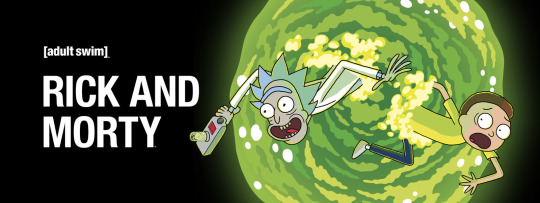
Honorable Mention: Rick and Morty (season 3): Shout out to Review as well, which was excellent but just had to few episodes for me to really count it. In terms of Rick and Morty it was often in the news (or at least the twitter news) for the wrong reasons this year as a group of its fans decided to act like complete dickheads for a period of time. All of which deflected from the fact it had its best season ever. I’ve always had issues with the show and basically how pro-Rick and his asshole behavior Harmon and co seem to be and this year didn’t necessarily dissuade me of that but on a week to week basis it was crafting, ambitious and well thought out stories, at a rate the show had never before.
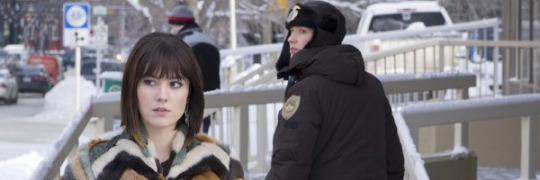
No 20: Fargo (season 3): As many observed this was not Fargo’s finest year and it maybe took a while to get going. It is also the case that 3 seasons in it is tougher for a show as idiosyncratic as this one to surprise us. When a seemingly major character dies in episode 1 it is less of a shock than it should be because that is what happened in season 1. Yet at the same time I so enjoyed this season and the performances by the likes of Carrie Coon (more on her later), Ewan MacGregor and David Thewlis and you still had episodes as excellent as The Law of Non-Contradiction.
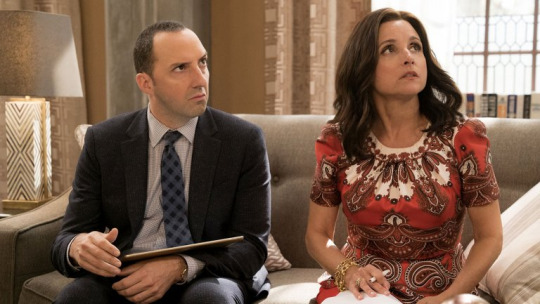
No 19) Veep (season 6): Similar to Fargo this was a just slightly below average year for Veep, but even then the quality of the ensemble is so far above any other comedy out there and the quality of the writing/jokes/insults is again just of the highest order. There are few shows I enjoy more than Veep.
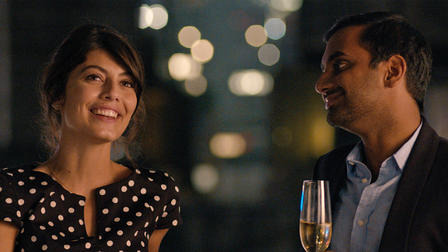
No 18) Master of None (Season 2): In my review I did write about how aspects of MON did frustrate me. For it’s social awareness, it is a show that wants me to desperately feel sorry for the man with seemingly the nicest/most privileged life in the world. The extent to which the show is essentially lifestyle porn at times can be a problem and the extent to which the show never questions Dev’s actions can also be a little off-putting. Yet having said that the good outweighs the bad and then some. The show crafts so many beautiful fully realized episodes and months after watching it is episodes like Thanksgiving that stick with me, more than the show’s flaws.
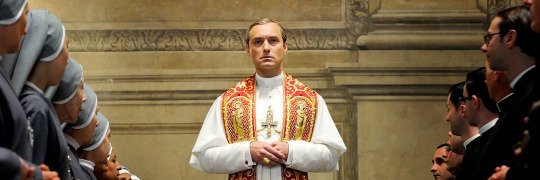
No 17) The Young Pope (Season 1): I’m not sure I get The Young Pope. I love it but I’m not sure I get it. Even in this age of weird TV there is something truly odd about this show. So difficult to write about because it does not conform to any conventions or labels and that’s why it makes this list. Having said all of this I’m not quite sure the show ever hit the heights of its pilot (even if it remained excellent throughout) and that’s why it is not a little bit higher.
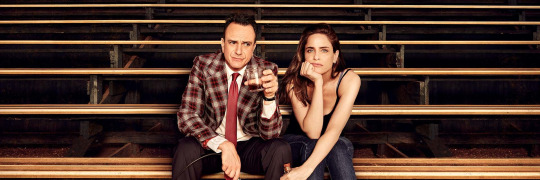
No 16) Brockmire (Season 1): Brockmire is exactly the sort of gem that can get lost in this golden age, but for those few of us who did see it we know that it was one of the most raucous, hilarious and endearing comedies out there. I don’t know or care about baseball at all but I do love Brockmire and can’t wait til it comes back.
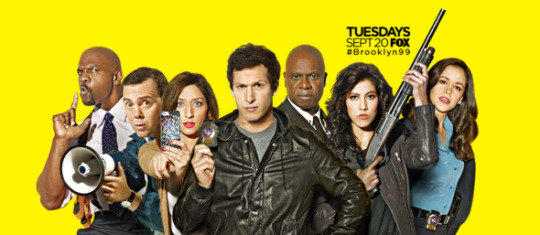
No 15) Brooklyn Nine Nine (season 4/5): Just as Brockmire can get lost in a sea of amazing shows, B99 is the sort of show that you can take for granted so easily but 5 seasons in and it is still full of heart and brilliant gags. More than that though this year on a couple of occasions we saw the show break-out of its comfort zone with episodes about Terry being racially profiled and more recently Rosa coming out to her less than progressive parents. Those episodes showcased a different side of the show and demonstrated how B99 is not just a great sitcom but an important one. Nine Nine!
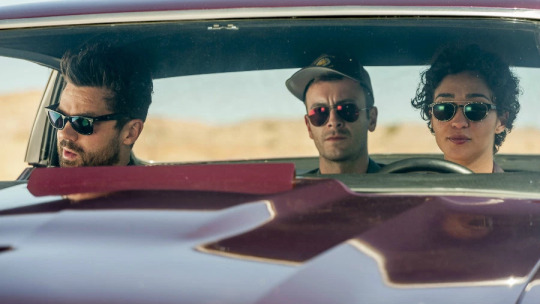
No 14) Preacher (Season 2): Parts of season 2 of Preacher were as good as anything on TV. The opening scenes of the first two episodes, as well as standout episode Sokosha plus a whole host of other moments, showed how Preacher could execute some of the most ambitious TV out there to near perfection. It was not all perfect and the season might have benefited from being 10 episode long rather than 12 but nonetheless I love this show and it seems to only go in one direction. Bring on season 3.
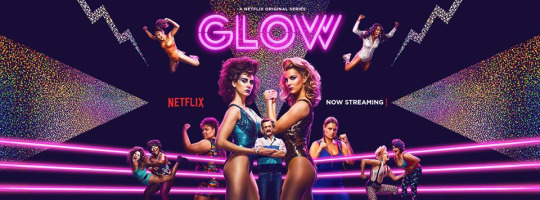
No 13) GLOW (Season 1): GLOW was sort of the perfect summer show. It was funny and likable and so binge-able. Netflix makes a lot of deeply serialized shows, designed to be consumed in one sitting so as you find out what happens next. Glow was not that. What GLOW was, was a show that quickly established an ensemble of distinct and interesting characters who you wanted to spend time with and for that it was a standout show.
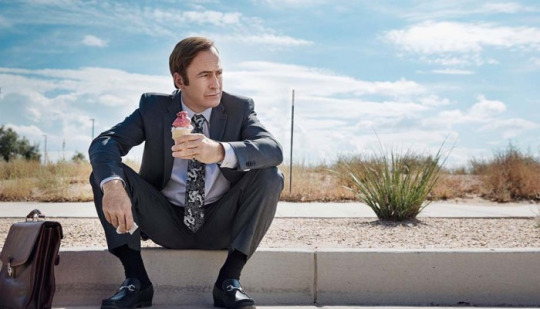
No 12) Better Call Saul (Season 3): It pains me to put BCS at number 12, in any other year this could be a contender for my number 1 spot but here it does quite make the top ten. Part of the reason why it is a little lower than you might have excepted is that at this stage I don’t have to tell anyone how good this show is. Into it’s third season and BCS was possibly better than ever. Certainly episodes like the chilling Lantern and in particular Chicanery mark series high points and some of the finest TV I’ve seen all year.
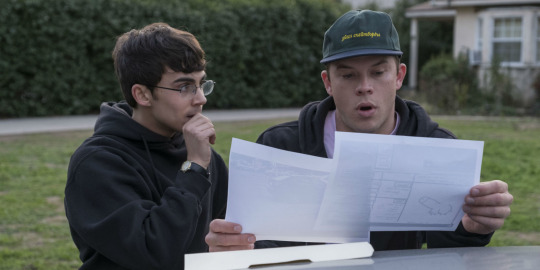
No 11) American Vandal (Season 1): American Vandal is a curious show. It is ostensibly a parody, yet by the time you finish it you look back and think that was funny but not funny enough to be making this list necessarily. What it was though was the most engrossing show of the year. And it all centred on the question “who drew the dicks?” Yet for the silliness of the premise I could not have been more intrigued. AV found new ground for the most tired of sub-genres, the mockumentary and in the process delivered an absurd but in many ways tragic story of a stupid but well meaning kid in high school whose life goes array for reasons that have little to do with him. Defining the pleasures of the show may not be straight, but boy was it insanely watchable-the Netflix model at its best.
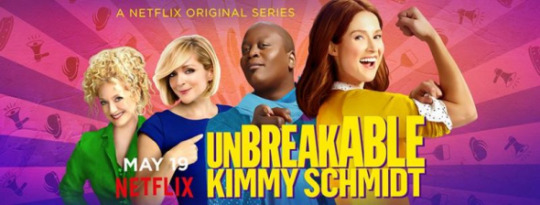
No 10 )Unbreakable Kimmy Schmidt (Season 3): Similar to B99, UKS is the sort of consistent joke machine that you can take for granted, and that many have, but for me this year there were few shows enjoyed nearly as much as it. I thought the show delivered its best season. The work of Ellie Kemper and in particular Titus Burgess can match any comedic performers on TV. Again though amidst all the laughs is a very human character study piece of an abuse victim and maybe where the show’s genius thoroughly lies is in the way the show balances these two sides of itself.
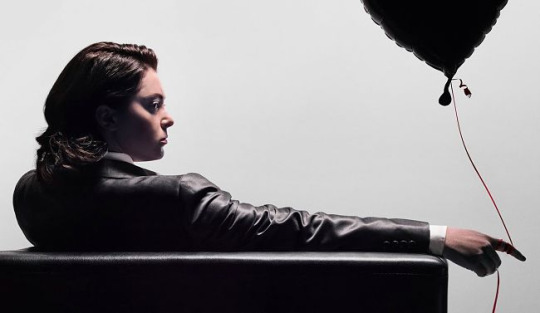
No 9) Crazy Ex-Girlfriend (Seasons 2/3): Rachel Bloom’s musical comedy/drama goes from strength to strength. Like many shows of this list it perfectly balances cartoonish sensibilities with discussions on mental health and never more so than in the first half of season 3. In addition to that though are the musical numbers. At times I’m just in awe of how spot on and clever their parodies, my favorite this year being “Let’s Generalize About Men” and for that it had to make my top ten.
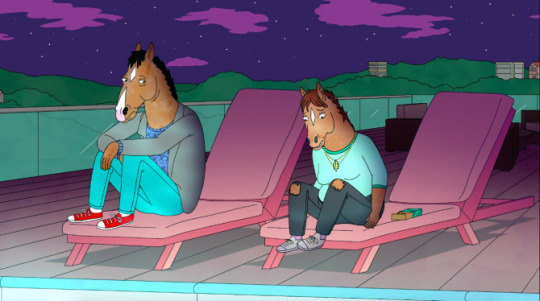
No 8) Bojack Horseman (Season 4): In its 2nd and particularly 3rd seasons Bojack became a show that delivered some of the most outstanding individual episodes of television, possibly ever. Escape From LA, Fish Under Water and That’s Too Much Man are just incomparable half hours of TV. Season 4 did not deliver a single episode of quite that standard. What season 4 did do though is deliver quite possibly the show’s most consistent, revealing and hopefully season. Something we all needed at the end of the show’s previous season.
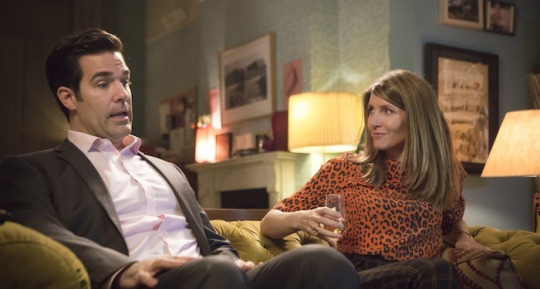
No 7) Catastrophe (Season 3): Okay it was only 6 episodes along, but I ask this question every year, is there a better written show on TV? There might be snappier dialogue out there, there might be more profound existential musings on some other show, but there is no show with more wonderfully naturalistic dialogue on now or possibly ever. Also there is not really a couple of TV I root for quite as much as Sharon and Rob and I really just want to watch the two of them on screen together as much as possible.Plus the final episode of season 3 was just the perfect send-off for Carrie Fisher and for that alone it deserves it place on my list.
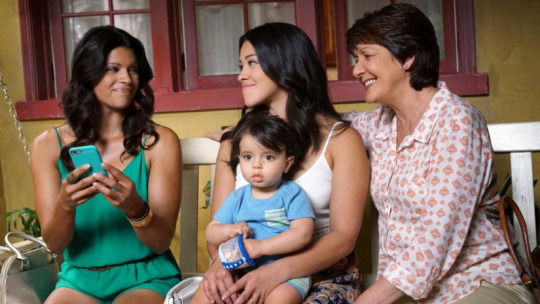
No 6) Jane The Virgin (Season 3/4): Now four seasons in Jane the Virgin still has the power to surprise and hit me emotionally as much as just about any show on this list. I would go as far as to stay no episode of television this year hit me as hard as (spoilers) Michael’s death which was absolutely devestating. But when it comes to Jane the Virgin it is not just the big gut-punches that count, it is the smaller moments as well. The other scene that sticks with me most from its episodes this year is when Rogelio (often the show’s most comic presence) opens up to Xo about how he hasn’t been able to grieve properly for Michael, who was his best friend, because he knew he had to be strong for Jane while she was grieving. It is a comparatively small moment but every bit as resonant. I can take or leave all the intrigue concerning the Marbella but week after week the show delivers moments that really effect me, which even in this golden age can’t be said of too many show.
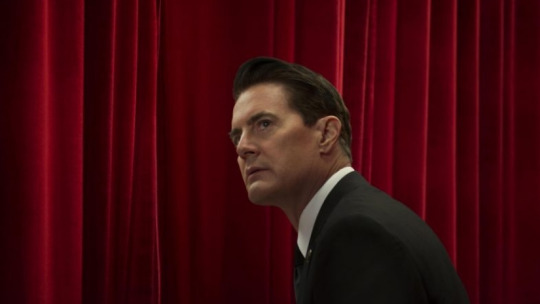
No 5) Twin Peaks (Season 3): It seems to me that Twin Peaks has either been number 1 or completely absent from every critics list. And I can understand both positions. Twin Peaks was fascinating in a way that television and art more generally rarely is. It was also incredibly and deliberately frustrating at times. I’m almost reluctant to point out how obviously frustrating parts of the revival were because I feel like I might be missing something. On the other hand because its Lynch and because he is a widely and rightly acknowledge genius I think some critics have been too forgiving of some pretty blatant narrative issues, that on another show they would have lambasted. Ultimately though it was the TV event of the year and nothing quite engaged me on a week to week basis like it did. More than anything though there were certain moments, particularly toward the end of the season, that were greater than anything else on TV this year. Moments I completely lost myself in, in ways that are quite difficult to explain and for that I won’t be forgetting the revival for a very long time.

No 4) Mr Robot (Season 3): If season 1 was clinically perfect, in a way no show since Breaking Bad has been, season 2 was an over-ambitious, definitely fascinating, mess. I was a bit of an apologist for the largely disliked second season-but even I was somewhat disappointed after the heights of season 1. Season 3 not only got the show back on track but it found a balance in the ensemble that neither season 1 (which was almost all Elliot) or season 2 (which felt like very little Elliot) had. It also starting making sense again and the show successfully battled the urge to be overly opaque or to have unnecessary twists. All of which meant that we got some of the show’s finest hours yet specifically the thrilling fifth and sixth episodes as well as the surprising and heart-warming eight hour, not to mention the finale which had a bit of everything. And for all its pessimism few shows made me happier this year, because I was so delighted to see this great show prove all the doubters wrong.
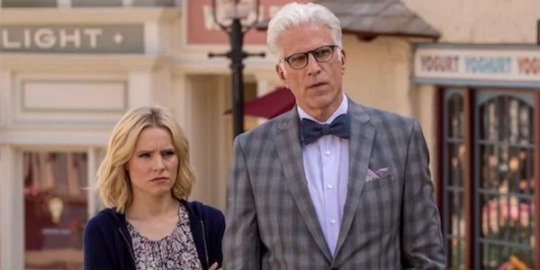
No 3) The Good Place (season 1/2): Michael Schur has secured himself a place in TV history with The Office, B99 and in particular Parks and Rec, already but with The Good Place he has gone one further. We all knew he could craft wonderfully funny and likable sitcoms, but here he has delivered a show as twisty and as engaged in huge philosophical issues as any prestige serialized drama. The Good Place is not necessarily a sad-com like many of the show’s on this list but it is possibly the most plot driven network sitcom ever. The thing is the plot has real stakes and is completely unpredictable as well. The huge twist at the end of season 1 showed that even in the age of Reddit you could pull out the rug from underneath your audience and I did not think that was possible. I don’t know how much longer they can continue it but as of now The Good Place is just about a perfect piece of television.

No 2) Halt and Catch Fire (Season 4): Without spoiling what is number 1 on my list, when it aired I thought nothing would come near it but Halt and Catch Fire came very very close. Back in its much derided first season Halt was a jukebox spitting one antihero cliche after another. In some ways it never strayed too far from the conventions of the antihero drama but what made it different was that at a certain point it just wasn’t about antiheroes. Sure all the characters were deeply flawed, none more so than Joe, but their constant strive for something more, for some kind of connection felt so human you could not help but love them. The final four episodes were TV drama at its best and when it ended I really struggled with the notion that I would not be spending more time with these characters, but if anything made it okay it was how well they stuck the landing. Speaking of which..
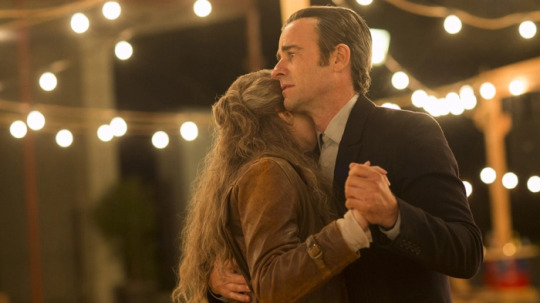
No 1) The Leftovers (Season 3): No show has ever made quite the impact in such a short space of time. The Leftovers conclude its mere 28 episode run this year, just 28 episodes yet about half of them are nothing short of masterpieces. That includes just about every episode in this final run. It’s tough in just a paragraph to breakdown what made The Leftovers such a transcendent piece of television-so to be glib I’ll say it took the ambition and phantasmagoria of Twin Peaks and combined it with the heart and focus on character of Halt and Catch Fire. LOST-one of my absolute favorite shows of all time-will define Lindelof’s career but The Leftovers is ultimately a more complete and mature piece of work. The writing, performances and direction coalesced to give us something often hilarious and surprising and always deeply powerful. There may never be a show like The Leftovers again and for those reasons it was always going to be my number 1.
#best of#best of lists#the leftovers#carrie coon#justin theroux#halt and catch fire#the good place#mr robot#rami malek#twin peaks#jane the virgin#Catastrophe#bojack horseman#bojack season 4#crazy ex girlfriend#unbreakable kimmy schmidt#american vandal#Better Call Saul#preacher#veep#fargo#brooklyn nine nine#brockmire#rick and morty#glow#the young pope#master of none
1K notes
·
View notes
Text
Thoughts on Bojack Horseman Season 4:

Four seasons into Bojack and the fundamental qualities of the show largely stay the same. Bojack is an incredibly funny show at times and an incredible sad one at others. It blends the silly and the profound better than just about any show out there. It is inventive and ambitious with its animation making for some of the most beautiful images ever sketched for TV and it remains a totally unpredictable show four seasons in. All of this we already knew, so what makes Bojack season 4 different?
Cutting to the chase, I think the main change here is the transition Bojack has made from a great character study to a great ensemble show. I don’t mean to imply that Bojack did not always have a great cast of characters and performers, it certainly did but this year something was different. The character Bojack felt less like a central driving force and more like a part of a richer tapestry, than ever before.
We got episodes dedicated to Todd, Princess Carolyn and Bojack’s mother, as well episodes that had no Bojack in them period. Bojack still had a big part to play but I think the writers recognised something important, that in a long running dramatic series at a certain point you need to start distributing the dramatic weight of the show among the full ensemble.
At the end of season 3 Bojack’s story had hit such dramatic heights (or rather depths) that this year for him became more about his recovery and the drama of his arc became more understated. With that though the real massive gut punches of this season were often found elsewhere.
The finale was overall the most positive and hopeful one the show had ever delivered but even within that was the potential breakdown in the relationship between Diane and Mr Peanutbutter. It is classic Bojack moment, when Diane starts her speech on the nature of their marriage you feel like the show is going for a tidy conclusion but instead it delivers something much more messy and true to their arc this year.
This season’s outstanding episode and moment for me came in the Princess Carolyn episode. The final moment where she reveals that what we thought were flash-forwards were just in fact her imagination is just an incredible moment of television. Bojack Horseman can pull the rug out from underneath you better than any show out there. Although that whole episode had in theory been quite sad, as her relationship and prospects of being a mother ended, we thought that everything would be okay because we were seeing her future great-grandchildren, but then in a single moment the show takes that security net away from us to reveal something unremittingly sad and with no inevitable happy ending.
Todd’s arc slightly petered out but he remains such a fun presence on the show and his struggles with his asexuality feel like genuinely original subject to tackle on TV and that makes him consistently interesting.
Bringing it back to Mr Peanutbutter though, I was initially hesitant about the whole Trump allegory but the show went in unexpected places with it. By a few episodes it was clear that the show had no real interest in doing some on the nose Trump critique and instead the arc became about his relationship with Diane and highlighted how tragically incompatible they are at times.
The plot and flashbacks with Bojack’s mom were the season’s most viscerally depressing stuff. At times it felt like it was almost too much but the show found inventive and creative ways of telling this horribly sad story. It was an important story to tell as well because I think in the past I felt that the whole Bojack had a tragic past was a bit cliched. It has become a habit of modern TV and film to give dislikable characters horrible childhoods to make them more likable, but by giving his mother a full and tragic arc as well it gave a richness of meaning to previous flashbacks of Bojack childhood.
The final moments of Time’s Arrow seemingly mark the first time a male figure has ever treated her with compassion, as Bojack comforts her, admittedly with lies, but nonetheless does something that no one else in his family history had the generosity to do.
Taking a step back I’m interested by pieces by the likes of Matt Zoller Seitz claiming this to be the best season of the show. I’m not sure I agree, but I think this might be the most complete season of the show, even if the third maybe hit me that bit harder at times. Yet I also suspect that when I rewatch this season it might just ascend to the top of my season rankings.
#bojack horseman#bojack season 4#bojack spoilers#Will Arnett#mr peanutbutter#diane nguyen#Alison Brie
109 notes
·
View notes
Text
Emmy Reaction:

In the few years I’ve been doing this blog I don’t think I’ve ever been less interested in the Emmy’s. This is mainly the result of the fact that, at least in the drama categories, I didn’t have a horse to back. While I’m a big fan of Better Call Saul the rest of the shows nominated in best drama category were shows I had either seen and not liked, or in the case of The Handmaid’s Tail not yet seen. Still I was happy to see it win, just because if it was not going to be BCS I didn’t want to see Westworld or House of Cards somehow walking away with the big prize.
Again most of my gripes stem from the nominations rather than the awards themselves. The complete omission of The Leftovers was both predictable and completely out of order. While Sterling K Brown and Elizabeth Moss are both phenomenal actors, very worthy of awards Theroux and Coon should have really been walking away with the Emmy considering their work in that final season.
Speaking of the best actor and actress categories, as I say I love both those actors who won but it did seem like the perfect opportunity to finally give Matthew Rhys and Keri Russell or even Bob Odenkirk something that their performances have been crying out for, for several years now. Brown and Moss will get plenty of more opportunities to win but with each passing year we get much closer to a reality where neither star of The Americans ever gets recognition their work warrants and that would be unfortunate.
Also unfortunate was the best supporting actor in a drama category. Great actor that Lithgow is, one of Michael McKean or Christopher Eccleston should have been winning, let alone get nominated. Now neither will ever win an award for their performances in their respective shows, which is also a big disappointment.
The Emmy’s got it more right in the comedy categories but it was still a mixed bag. Much as I love Veep in no world should it be beating that first season of Atlanta, particularly when it was a relatively middling season of the political satire. In some ways the Emmy’s made up for that by giving Glover the best actor nod but he probably shouldn’t have won that, considering the work Jeffrey Tambor is doing in Transparent. Louis-Dreyfus once again won and while she is totally deserving it seems like it is time to recognize some of the other great performances out there, not least the likes of Ellie Kemper.
Still there were certainly some pleasant surprises (if you can call them that) like character actress Margo Martindale Ann Dowd winning and even if it was for The Handmaid’s Tail it did feel like some indirect gratification for The Leftovers but ultimately I would describe this as a year to forget for the Emmys.
#the emmy awards#emmys 2017#ann dowd#ellie kemper#unbreakable kimmy schmidt#Jeffrey Tambor#Better Call Saul#the handmaid's tale#elizabeth moss#transparent#the leftovers#justin theroux#donald glover#atlanta#veep#julia louis dreyfus#house of cards#westworld#stephen colbert#sterling k brown
5 notes
·
View notes
Text
Some Thoughts on Bojack Horseman S4 Ep6 Stupid Piece of Shit:

The golden age of TV is littered with enigmatic antiheroes, in particular the likes Don Draper and Walter White had an unpredictable streak to them and the way they were written kept a certain distance between them and the audience. Even after seven seasons it was never exactly clear how Don would process a situation. With Stupid Piece of Shit Bojack Horseman once again finds a way of subverting established traits of antihero-lead TV by throwing us, as directly as possible into the mind of Bojack Horseman.
I’ll do a full season review in a few days time once I’ve finished the season (slow binge this year) but suffice to say Stupid Piece of Shit does for season 4 what Fish Out of Water did for season 3. But where that episode lowered the volume on everything (it was almost completely dialogue-less) Stupid does the opposite.
While internal monologues are common place on TV, I don’t think I’ve ever seen one used like this. Usually they are a short-cut to exposition and a constant presence throughout the show, but here it just pops up for the one episode and has nothing to do with giving the audience information on the plot, rather it is purely used as a tool for further exploring Bojack.
The episode continually highlights the disconnect between what Bojack thinks and the way he acts. He has some sense of right and wrong but isn’t mentally stable enough to really display it. He throws about the baby toy even when he knows it wrong but he can’t help himself. The show presents Bojack as this classic narcissist, obsessed with himself at the expense of others but also with a voice in his head that is constantly telling him that he’s worthless.
The first time Bojack calls himself a “stupid piece of shit” he follows it up by him questioning if whether the fact he knows this makes him better than all the other stupid pieces of shit. Bojack’s internal monologue is capable of spinning anything to justify his actions, he’s able to look at all the shitty things he has done and say well at least I’m aware I’m an asshole. Yet his thoughts don’t always provide this function. At other junctures he does the opposite. He takes something and instead of shedding some convoluted positive light on it, he spirals and takes a thought to the darkest place he can.
While the titular “stupid piece of shit” indictment is very absolute, there is a subtly to the way Bojack’s thoughts are written that makes this episode so engrossing. In broad strokes Bojack’s thoughts present him as the self-hating LA narcissist type that I earlier alluded to, but the closer you look the more you see these more nuanced contradictions.
I talked earlier about how this episode subverts the enigmatic antihero archetype, but more than that the mystery surrounding the likes of Draper and White also served to kind of glorify and emasculate them. Bojack is never anything but pitiful here and that’s weirdly refreshing. The writers don’t ask us to admire Bojack in spite of his actions (as is often the case on antihero shows) but instead ask us to see the pity he feels for himself and maybe also feel that for him.
The final moments are perfect and feel significant. To this point season 4 is being driven by Bojack’s relationship with his long lost daughter and their final moments together in this episode seem to clarify their connection. When she talks of that little voice that we’ve been hearing all episode and Bojack tells her that it doesn’t last, it is in many ways a sad moment but it also rather paternal and in that way might show some hope and growth.
104 notes
·
View notes
Text
Thoughts on the Twin Peaks Finale and the Revival Overall:

Just before he died the rock great Lou Reed wrote a fascinating piece on Kanye West’s album Yeezus. In the piece Lou Reed writes about the trick of divisive mercurial artists like Kanye West and Axl Rose is how they release more introspective, self-critical work to draw you in, to make you like them, only to follow it up with the most bravado and unrelentingly “them” thing they can to challenge you to once again hate them. This is kind of how I view what Lynch is doing in the last 2 episodes (counting the final two hours as one episode) of Twin Peaks.
The penultimate episode of the revival sees Cooper as Cooper, something fans have been waiting for for a 1/4 of a century plus 15 hours. It is a phenomenal hour of TV full memorable scenes only bettered by the hour that follows it. The first half of the finale is entertaining, ingenious and cathartic, but then comes the second half and the most deliberately frustrating hour of television ever. Lynch gives the audience want to a point, enough to draw them in, but with that final hour he gives the audience what he wants and what he knows most of them don’t.
Getting annoyed at Lynch for delivering a dark, ambiguous end is like getting annoyed at a fish for swimming, and I wouldn’t want him to do anything else anyway, but I also think people who feel frustrated at the final hour have a right to feel frustrated because it is very consciously designed to illicit that response.
Twin Peaks the revival is not the first show to end ambiguously but this is a unique end. The Sopranos gives you a choice, do you believe Tony died or not, Mad Men leaves it to you question what the ad means in terms of Don’s existential journey but what this finale does is far more opaque than that. There is no binary choice here. We are not left with any specific questions beyond “what?”
I’ve heard interpretations that people have, mostly concerning some sort of alternate universe/timeline being created but I don’t really have an interpretation, what I do have is a kind of analytical reading of it. For me the final scenes are a kind of meta commentary on the journey the audience takes. Cooper and Palmer travel from Odessa to Twin Peaks, it is a slow and tense journey that Lynch lingers on, not just to build tension but also anticipation. In the end though all that tension has no release, the miles they traveled, the years we waited and the eighteen hours we spent watching this revival have no payoff and you are left questioning what year it is and screaming outside of someone’s house. The journey taken by Palmer and Cooper is the same as the one taken by the audience, beyond this I’m not sure what it actually means but there is that.
I sound kind of negative about the finale or at least the second half. It is tough for me to get past how frustrating I found watching it. I did not necessarily expect anything from it, I’m familiar enough with Lynch to know the kind of endings he favors, but the pacing of it does create this quite visceral agitation. Yet the more I reflect on it the more I can’t help but to love it’s boldness and just how thoroughly uncompromising Lynch’s artistic vision remains after all these years.
Lots of the discourse around the finale surrounds what actually happened in it, naturally, but just as interesting is what was not in it, that being about 90 percent of the plot threads established in the previous 16 hours. Lynch not only doesn’t give the stories concerning the likes of Audrey and a whole host of new and old characters alike, a conclusive end but he doesn’t give them an end of any kind.
The more I look back at these 18 episodes the more I get the impression Lynch was not all that invested in doing a Twin Peaks revival, rather he saw it as a vessel for him to explore all of these ideas he has had in his ten years away from the camera. Consider how little of Cooper we have, even when he comes back the Cooper we get in the final episode seems to exist in a kind of grey area between good and evil Coop. That approach to the revival made for some of the most amazing and groundbreaking TV ever but also for a slightly bloated and certainly incohesive 18 hours of television.
That sounds like a bigger criticism than it is. I wouldn’t swap this for anything. Even in this age of weird TV I’ve never seen anything like this. On a week to week basis I had this sensation that anything could happen, that any notion I had of what TV was could be shattered and I can’t say that about many shows. More often than not this felt like the best case scenario, and then some, for the revival even if occasionally it could feel like a worst case scenario as well.
At this point I could tackle any random part of this show, good, bad or great (or Trent Reznor) but I think I’ll leave it at this and return to the subject some time later. Suffice to say for it’s flaws, for it’s dead ends and loose ends, for it’s excessive and uncomfortable violence toward female characters, for it’s crazy lack of Cooper, I’m still so happy and grateful that we ever got these 18 episodes and I would take as many more as was possible right now.
3 notes
·
View notes
Text
Top 10 Netflix Originals
Netflix is producing original shows at an insane rate, and it has to be said some of them are truly awful but here are ten that show why Netflix is still ahead of the game when it comes to original content of streaming services and why it is simply one of the strongest outlets of quality television. *I am including shows that were originally on another network but are now being produced by Netflix
No 10) Lady Dynamite: Lady Dynamite did not always work for me but it was a show that is trying to push the boundaries of the sitcom the way co-creator Mitchell Hurwitz did with Arrested Development ten years ago. It is endlessly inventive and ambitious but most importantly Lady Dynamite is often very funny.
No 9) Narcos: House of Cards does not make my list because in my eyes it is one of the most overrated shows of all time, the narrative around it is about how it got bad but for me it was never good, also for me Narcos does what House of Cards fails to. House of Cards aims to be both a fun and a prestige drama and often fails with both but Narcos often dispenses with any greater pretensions. It flaws have been well documented but it is fun and at it’s centre is/was one of TV’s most engaging performances in the form of Wagner Moura as Pablo Escobar.
No 8) Love: It is easy to talk about what Love is not, it is not as funny as You’re the Worst or as ingenious as Catastrophe but it has many strengths of its own worth celebrating. The performance of Gillian Jacobs in particular but also supporting cast members such as Claudia O’Doherty stand out. The show is also capable of being incredibly charming, which can sometimes be forgotten about because I think second halves of both seasons have slightly lost their way and have been to aggressive in portraying the flaws of the leads. In the end though the good more than outweighs the less good.
No 7) Jessica Jones: Of the plethora of superhero shows and movies, Netflix made or otherwise, Jessica Jones stands out. The way it deals with themes of sexual abuse and trauma are far more deft and subtle than you could have ever imagined from a superhero show, it also has one of the best villains in recent memory in the form of David Tennant’s Kilgrave. For all of this the show suffers from going on about 3/4 episodes too long and from several silly/convoluted plot lines, ultimately though the strengths make it very worthwhile.
No 6) Lovesick: Originally on Channel 4 and called Scrotal Recall (I wonder why it got cancelled) Lovesick looked to have been over after six episodes but Netflix rescued it at the last and we should all be grateful because it is a hidden gem. Charming, centred on a genuinely clever conceit and with a will they/won’t they at the centre that we actually care about Lovesick is one people should seek out.
No 5) Master of None: For some this may be a little low for a show many see as the height of auteur comedy and yes at times Master of None can feel like exactly that although it can frustrate in equally. In fact the extent to which MON does frustrate is testament to just how good it is capable of being and often is. There have been lots of thinkpieces written about how it deals with certain issues in such a progressive way but for me the thing that I think MON should be praised most for is the way it handles the episode as a unit of storytelling. Netflix originals often struggle with being too serialized but while MON has ongoing arcs it tends to treat the episode as a short film and that is part of the reason it has produced so many of the best half hours Netflix has ever given us.
No 4) GLOW: Having aired/dropped only one season I’m reluctant to place this any higher than forth but GLOW debut run made for a perfect summer binge. Television is obsessed with the 80s at the moment for better and worse but GLOW is less about period and more about its characters and it’s ensemble cast is one of the strongest on TV. Each character feels identifiable, real and most of all like the sort of people you want to spend time with.
No 3) Orange is the New Black: OITNB has been an up and down ride but ultimately it is the most important show made for many years on any network and the one that best defines what Netflix is or at least wants to be. Forward thinking, progressive but not perfect. OITNB is often and easily maligned but we should celebrate because not only is at times excellent but It’s overall impact on the industry will be for the betterment of television.
No 2) Unbreakable Kimmy Schmidt: Of all the excellent shows peak TV has given us Schmidt may be the easiest to take for granted because it is rarely anything but funny. It is the most consistent joke machine out there and I’m not sure there is a show more enjoyable to be watched at this moment. But you have probably heard before how funny it is, what can go under the radar is how clever it and thoughtful it can in its study of a character who has experience severe trauma. It may never not be funny, but it combines those laughs with often subtle and tragic characters beats that ring true of someone who went through what Kimmy did and for that it comes so high on my list.
No 1) Bojack Horseman: If you had told me after I watched the Bojack Horseman pilot that I would one day be calling Netflix’s best show, I would not have believed you. I didn’t hate the pilot but it struck as such a standard animated satire on celebrity (sounds more niche than it is) that I stopped watching it and for a while totally forgot that it even existed. When 18 months later I was convinced to come back to it I found myself consistently surprised at how good it could be. Bojack is one of TV’s funniest show but it is also one of it’s saddest. Year after year it seems to find new heights or rather new depths of despair that could be unbearable if it wasn’t so funny and for a show about an animated talking horseman, few things on TV feel as human.
#lady dynamite#narcos#love#lovesick#Jessica Jones#the defenders#master of none#glow#Orange is the new black#oitnb#unbreakable kimmy schmidt#bojack horseman
8 notes
·
View notes
Text
Game of Thrones S7: How The Show Became Better and Worse

Game of Thrones from it’s beginning has been a polarizing show but in its seventh season it has found a way to be polarizing in ways it has been before. Thrones amended some of the biggest flaws of it past but it also lost some of what made it great. That is to say that Game of Thrones did something it has never done before to me, it left me cold.
Let’s look at the positives before we delve into this season’s problems. If one of my biggest issues with the show in the past was just how sadistic it was, particularly when it came to sexual violence, this season I never felt the show was about to make me sit through another horrible rape scene. Last season showed signs that the show may be past this trait and this season all but confirm that the show has lost the compulsion to treat it’s female characters in this way. More than this the show’s attitude to sex seems to have completely changed. Take the scene between Dany and Jon in the finale, forgetting it’s incestuous nature for a moment, it is shot to look quite tender, even by the standards of consensual sex on Game of Thrones.
Yet for these improvements the show has lost some of its edge. I disagree with the view implied by some that by dispensing with their more sadistic, torturous compulsions the show has inevitably lost all of it’s nastier streaks. I think there is a version of the show where the good guys don’t have to be tortured, but also where the good guys are not completely death proof. What we have now though is a case where the show seems more reluctant than ever to kill a major character or even some secondary and tertiary characters.
The pacing has also been a huge problem, one talked about to the point to ad nauseam but it’s worth pointing out again how pacing has always been a problem for Thrones, it was just a problem in a different way this year. In the past the show had a tendency to wheel-spin but here it burnt through plot like an ice dragon. In that way it felt like a cheat. Ultimately the now common complaint that characters can seemingly teleport from destination to another is just a nitpick, but it does go against a lot of what the first six seasons had established.
The best way of approaching this season’s issues is through the penultimate episode which did seem to crystallize a hell of a lot of what was wrong with this run of episodes. Firstly, as earlier alluded to, although a dragon dies all the major and even semi-major characters survive against all odds and against everything the show taught us about itself.
More to the point though the final moment of that episode really clarified something for me. All of a sudden it becomes apparent how the whole season had been reverse engineered around the birth of the ice dragon. From early on the show has made it clear how Dany and the dragons must win and in this run it had to find a credible reason why she wouldn’t end the show on the iron throne, to at least create a sense of jeopardy. Ice Dragon is that reason, but to get to that point it had to compromise on character.
It was such an obviously stupid plan and on the one hand while it is a well established character trait that Jon Snow is an idiot, Tyrion was the one to come up with the plan and he is not an idiot. That kind of development feels sort of egregious, knowing all we do about Tyrion. And that was not the first time this season that the show portrayed Tyrion as tactically inept and his sister as some Machiavellian genius, even though it had also long been established that she was not nearly as smart as she thought herself to be.
The spectacle of that episode and the season as a whole was incredible but I also felt that bigger the show gets the more it loses the small character beats that define the show at its best. More interesting characters, such as Tyrion become increasingly marginalized because his role in the ultimate conflict is not as significant as that of the charisma vacuums Dany and Jon.
The finale was altogether much stronger than the previous episode and was also truer to its characters (of course Cersei wouldn’t make a truce and of course Sansa is not that oblivious to the ways of Littlefinger) but it still left me cold in a way Thrones has rarely done before.
Ultimately it just lacked the shock and surprise I associate with the show. There was nothing like the first twenty minutes of last years finale or like Tyrion murdering his father. All the major developments of this finale felt telegraphed. Jon and Dany would have sex, Cersei and Jaime would turn on one another (again though it seemed inevitable in that moment that Jaime would die and yet he walks away), Cersei would lie to her enemies about a truce, Sansa and Arya were playing Littlefinger all along and the Ice Dragon would destroy the wall.
Maybe that last one was slightly less predictable but it was far from a complete shock and it again left me wanting more. Like so much of the season the spectacle was amazing but without the involvement of one of our major characters, to attach ourselves to, it lacked some of the impact the show’s best moments have.
And there in lies the main problem with this season, as the show gets bigger and bigger it loses some of that character specificity that made for all of those lasting gut punches in seasons gone by. That is not to say that this season was not hugely entertaining and engaging but just that it left me somewhat dissatisfied.
#game of thrones#game of thrones season 7#Dany Targaryen#emilia clarke#jon snow#kit harrington#Tyrion Lannister
12 notes
·
View notes
Text
Mad Men 10 Years On, 10 Scenes; Group Therapy

“The only thing keeping you from being happy is the belief that you are alone.” Those of the words of Anna Draper to Don in season 2′s The Mountain King and so it proves the case. With the Person to Person Mad Men ends on a note of ambiguity but mitigated growth for Don. The man who has been defined by being the perennial outsider, learns that he can connect with another human being and that’s all we could have asked for.
In the end Don’s depression, his ennui all come down to that. His inability to empathize, to recognize that some of the people around him love him and have tried showing that love to him and he’s just not been able or willing to see it.
The final few episodes of Mad Men see Don on the road, “playing the stranger” as Bert might say, after he leaves McCann and his life in New York. He leaves McCann not because his autonomy has been lost but rather his individualism. The last time we see him there, he is in a meeting with 25 other creative directors, who not only dress like him but talk like him. In the end though it is the fact that other people feel the same sense of loss and isolation as Don that saves him.
The climatic scene of the finale sees Don dragged into a group therapy session at the retreat he and Stephanie went to. After Don saw all those other men who could do his job (maybe not as well) at McCann he left in part because he didn’t feel needed. In the opening minutes of Person to Person he calls Sally and then Betty to be told the same thing, that what they need is not for him to be their knight in shinning armor and instead to largely stay out the way.
Don goes with Stephanie to the retreat but after a different (earlier) group therapy session goes wrong she calls him on his shit, She tells him that his “move on” mantra is bullshit and that there is no moving past your past, it is a part of you and you just have to accept that and live with it.
Don’s been told these tough truths in the past (remember Dr Faye’s “you only like the beginnings of things” or Menken’s “you don’t want to runaway with me you just want to runaway”) but what is different here is that he is told he cannot leave the retreat. He’s stuck in this, for him, purgatory forced to confront himself and for once Don cannot runaway. He has to face himself and the state of his life and its sends him to the edge.
He calls Peggy who maybe keeps him going for a little longer and then he gets dragged into session. Don looks dis-connected from his surroundings and when the chair on which the speaker sits opens up you are convinced it has to be our protagonist who sits there but in a classic bit of Mad Men subversion it is not.
Instead, previously unseen Leonard (an anagram of real Don, I don’t know what to make of that) sits down. Leonard is no Don Draper, he may be roughly the same age but he is balding and has an unremarkable aura around him. He talks about how his colleagues and family don’t seem to even notice him, reflecting how Don has often felt like a phantom of his own life. He goes on to say:
“ They should love me, maybe they do, but, I don't even know what it is. You spend your whole life thinking you're not getting it, people aren't giving it to you. Then you realize they're trying, and you don't even know what IT is. I had a dream I was on a shelf in the refrigerator. Someone closes the door and the light goes off, and i know everybody's out there eating And then they open the door, and you see them smiling. They're happy to see you. But maybe they don't look right at you, and maybe they don't pick you. Then the door closes again. The light goes off.”
And maybe for the first time ever Don sees that he is not alone. Back in season 6′s dis-orientating The Crash the daughter of the then recently departed partner Frank Gleeson asked Don to ask a question in his head and she’d tell him what it was. The question, according to her was “I’m I loved?”, she knew this because that’s everyone’s question.
Don was not ready or willing to hear that feelings of loneliness where not exclusive to him. Back in the pilot he told Rachel Menken “You live alone and you die alone” and maybe that is true in a certain sense but not in another and what Don realizes for the first time here is that we are connected by are experiences and emotions.
Leonard’s words about looking out and seeing people happy conjure images of Don in the opening scene looking at a bar full of people laughing and enjoying themselves while he looks bemused. Don knows now though that there is nothing to be bemused about and there is nothing stopping him from stepping in from the outside to join them.
And so he does. He embraces Leonard but that’s not the true culmination of his new found enlightenment. Instead Don channels his discovery that he can connect with others by buying the whole world a coke. He’s still an adman but he is not alone. Maybe Don will continue to remake the same mistakes again and again, but he’s not destined to be unhappy.
Mad Men as a show was too complex for Weiner and co to condense 92 hours of television into a couple of images but Don hugging Leonard and later smiling as we cut to the famous advert do a pretty great job of delivering a fitting and profound last statement on the very nature of our protagonist, of advertising and more importantly the human condition.
6 notes
·
View notes
Text
Mad Men 10 Years On, 10 Scenes; “The Moon Belongs To Everyone”

Re-watching the first part of Mad Men’s seventh season I was reminded why I love that run of episodes so much and how they are very underrated. In particular the final two episodes of 7A The Strategy and Waterloo, taken together feel like the crowning achievement of the whole show. The Strategy is Mad Men’s magnum opus on family, ending on that image of Don, Pete and Peggy by way of Nighthawks. Waterloo continues this idea family-like bonds but is not as easily seen through the spectrum of one concept, as reflected through its brilliant and subversive final moments.
Ghosts, phantoms and shadows of the past roam the halls of SCDP. Don spends most of 7A in the former office of Lane Pryce (who gets a name drop in this episode as well) and his death still haunts Don. Yet to label this the ghost of Bert, singing to Don in that final scene, would be inaccurate. In fact to label it anything would be inaccurate.
Impenetrable is a word I rarely use when I am talking about TV shows (unless I’m referencing the dialogue on Deadwood) but while Mad Men is at times very happy to highlight its subtext it was capable of producing moments like this which are as wonderful as they are confounding.
Bert’s message seems a simple one but contextualized in Don’s journey it is in fact quite opaque, which is fitting as Bert was always Mad Men’s most enigmatic character. At the end of season 6 Don ruined everything, his role at the agency, his relationship with his daughter and his relationship with Peggy. From the moment Don shows Sally his old home the story has been about him re-building those bridges.
By the end of Waterloo Don has reconciled with Peggy, he is back on speaking terms with Sally and he has got his real job with SCDP back. As Roger and co announce Sterling Cooper’s fate to its employees Don walks down to the first floor and is like a boxer who has been on the ropes only to come through and win and then he hears Bert’s voice.
As a viewer I intuitively know that this scene is great and makes sense within the visual and literary language of the show. Yet as I have already alluded to the scene is far from self-explanatory and its part of the reason I love it. Back in season 1 Bert told Don that he believed they were alike in that they were both ultimately driven by self-interest.
Bert said that with an assurance that being totally driven by self-interest was a good thing, but the last time we see him alive he is watching the moon landings, like everyone else, but unlike everyone else he is not with family or friends but rather his maid. Being guided by these capitalistic notions may serve you in business but not in life.
While I’m always reluctant to analyse lyrics in terms of how they relate to what they are the soundtrack of (or at the very least I’m skeptical of movies/shows that use songs that’s words match a little too perfectly with the action) but in light of all of this, in light of the little we knew about Bert, “The Best Things In Life Are Free” seems a particularly striking message. Maybe in death Bert is able to recognize what he didn’t in life and maybe this is his way of telling Don that the whole guided by self-interest notion is not good, is ultimately not worthwhile.
Maybe Don has earned back his place at work but at the expense of his marriage to Megan, who breaks up with him here telling Don that he doesn’t owe her anything. Maybe Bert’s message is designed to undercut the triumph Don feels he has achieved by making his way back to the top of SCDP. In fact the episode that Waterloo most resembles is the season 3 finale caper Shut The Door and Have a Seat in which Don saved the agency but not his first marriage. History repeats itself and once again the balance between Don’s work and home tends far more toward the former.
“The moon belongs to everyone” not only relates to the what is on the minds of all Americans but also alludes to ideas of ownership. On a show so often about white-male-privilege this is a message of equality but maybe more than that it is about how the ways in which everyone in the world is connected. As the show approaches its final bow, the subject of human connection comes more into focus and on some level Don is being told that he does not have to be the perennial outsider.
Robert Morse performs with all the gusto you would expect from an actor known for musicals and the scene is as off-beat and engaging as it is delightful. Bert retreats back into his office as the door closes (one more layer of mystique to the sequence) and the music abruptly stops, shifting into the sounds of type-writers. Don sits down absorbing whatever he had just experienced as we all are.
We had to wait another year for the final run of episodes, but that episode, and that scene alone gave us enough to chew over for 12 months as Mad Men so often did.
#mad men#Don Draper#bert cooper#waterloo#the strategy#peggy olson#jon hamm#Betty Draper#megan calvet#jessica pare
6 notes
·
View notes
Text
Mad Men 10 Years On, 10 Scenes; “Midway Through Our Life Cycle...”

“I had an experience. I don’t know how to put it into words.” Says Don about his Hawaiian journey and the first 10 minutes of the season 6 premiere The Doorway and he’s right. The opening scene of the season with Don and Megan in Hawaii are some of Mad Men’s strangest, most challenging minutes. They remind me of the Kevin Finnerty alternate reality episodes of The Sopranos in their feel and deviation from standard proceedings.
They exist in a space that television is rarely willing to. They are in many ways the cinematic actualization of Don’s ennui, just silently drifting but with this unmistakable undercurrent of death, that runs through the rest of the episode and season.
The previous season ended with The Phantom and You Only Live Twice, this one starts with The Doorway and Dante’s Inferno. “Mid-way through our life’s journey I went astray from the straight road and woke to find myself alone, in a dark wood.” Reads Don, the words reflecting the path he has taken. The Hawaiian setting is described as “paradise”,but the title may point to purgatory while Dante’s Inferno alludes to both as well as hell. Its ambiguous but the cut from POV of the heart attack sufferer to Don on the beach would signify that it is some kind of experiential representation of the afterlife.
Don’s silence would seemingly emphasis this. While we hear him read Dante he does not actually speak to anyone for several minutes. His lack of words and verbal interaction with others creates this sense of him being a passive almost ghost-like presence, looking back on a life that he has left behind. Again bringing it back to the last season, Roger and acid dropping socialites discussed the Tibetan book of the dead, which describes how in the post-death intermediate state we are not aware that we have died and Don journey’s through Hawaii evokes similar ideas. Significant to Dante’s depiction of the afterlife, specifically hell, is that it is segmented, broken down into nine circles and that these nine circles are located on earth, reaffirming the experience Don is having while still technically alive.
A signature shot of the show is the camera looking in at a character through a doorway and the title of this episode and its heavy death imagery gives that another layer of meaning. The doorway can be seen as symbolic of the intermediate state between life and the afterlife, but then again look at Roger’s talk with his therapist about how life is really just a serious of doors that you go through only to find more doorways. The doorway as a metaphor becomes the framework for Mad Men discussion on the extent to which humans can change, the characters are always making these transitions but that they never go anywhere. It is all false dawns and lost horizons.
You could argue that Don has never really been on the “straight road” but if he ever was it was last season when he was in a monogamous relationship with Megan. She represented his second chance but when he walked away from her set and from that life their marriage on some level ended. If you do indeed “only live twice” then Don botched his second chance at the end of the last season and begins this one a phantom in the afterlife.
Don’s does not speak for several minutes but even once he does it is not to Megan and he says nothing to her the entire duration of the show’s time in 50th state. It demonstrates just how much of an absent party he has become in their marriage, even when he is with her.
In his talk with PFC Dinkins the solider to be says to Don that he’s getting married as “married guys live long because they have something to live for.” It seems a quite ominous sentiment in light of Don’s growing distance from Megan. He might not be going to war but Don is being confronted with death in ways that ad-men would not be expected to.
Later on we see Don standing by the window of his office looking out to New York and we can here the same sound of the sea that we heard in the opening scene of the episode when he was in Hawaii. Is this Don’s progression into the next circle? What was Hawaii “the jumping off point” to? These questions linger over that scene and the rest of the two hours in what is one of Mad Men’s most esoteric and provocative episodes.

6 notes
·
View notes